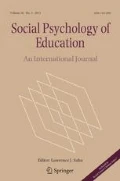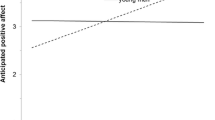Abstract
Professionals in science, technology, engineering, and math (STEM) are often stereotyped as geniuses and nerds (e.g., socially awkward). These stereotypes may demotivate some individuals from pursuing or remaining in STEM. However, these beliefs may enhance motivation among individuals who feel that they fit in with the stereotype. Guided by balanced identity theory and expectancy-value theory, our study investigated the effect of trait-based stereotypes about people in STEM among a sample of 256 U.S. high school students (Mage = 16, 59% girls, 65% Asian, 15% Latinx, 10% White). We assessed students’ trait-based nerd and genius stereotypes about STEM and related self-concepts as well as their STEM motivation (competence and value beliefs). Consistent with balanced identity theory, the effect and direction of endorsing nerd-genius stereotypes was moderated by a student’s own self-concepts. Endorsing stereotypes was negatively related to motivation—but only among those low in the related self-concept. Among those high in related self-concepts (e.g., high in nerd-genius self-concept), endorsing STEM stereotypes (e.g., STEM is for geniuses) was unrelated to STEM motivation. Girls, underrepresented students of color, and potential first-generation college students may especially be negatively affected by the stereotypes due to a greater likelihood that these stereotypes will be incongruent with their self-concepts. Thus, trait-based stereotypes about people in STEM may perpetuate current gaps in STEM.


Similar content being viewed by others
References
Bamberger, Y. M. (2014). Encouraging girls into science and technology with feminine role model: Does this work? Journal of Science Education and Technology,23(4), 549–561. https://doi.org/10.1007/s10956-014-9487-7.
Betz, D. E., & Sekaquaptewa, D. (2012). My fair physicist? Feminine math and science role models demotivate young girls. Social Psychological and Personality Science,3(6), 738–746. https://doi.org/10.1177/1948550612440735.
Bian, L., Leslie, S. J., & Cimpian, A. (2017). Gender stereotypes about intellectual ability emerge early and influence children’s interests. Science,355(6323), 389–391. https://doi.org/10.1126/science.aah6524.
Bian, L., Leslie, S., Murphy, M. C., & Cimpian, A. (2018). Messages about brilliance undermine women’s interest in educational and professional opportunities. Journal of Experimental Social Psychology,76, 404–420. https://doi.org/10.1016/j.jesp.2017.11.006.
Cheryan, S., Drury, B. J., & Vichayapai, M. (2013a). Enduring influence of stereotypical computer science role models on women’s academic aspirations. Psychology of Women Quarterly,37(1), 72–79. https://doi.org/10.1177/0361684312459328.
Cheryan, S., Plaut, V. C., Handron, C., & Hudson, L. (2013b). The stereotypical computer scientist: Gendered media representations as a barrier to inclusion for women. Sex Roles,69(1–2), 58–71. https://doi.org/10.1007/s11199-013-0296-x.
Cheryan, S., Siy, J. O., Vichayapai, M., Drury, B. J., & Kim, S. (2011). Do female and male role models who embody STEM stereotypes hinder women’s anticipated success in STEM? Social Psychological and Personality Science,2(6), 656–664. https://doi.org/10.1177/1948550611405218.
Cundiff, J. L., Vescio, T. K., Loken, E., & Lo, L. (2013). Do gender–science stereotypes predict science identification and science career aspirations among undergraduate science majors? Social Psychology of Education,16(4), 541–554. https://doi.org/10.1007/s11218-013-9232-8.
Cvencek, D., Kapur, M., & Meltzoff, A. N. (2015). Math achievement, stereotypes, and math self-concepts among elementary-school students in Singapore. Learning and Instruction,39, 1–10. https://doi.org/10.1016/j.learninstruc.2015.04.002.
Danbold, F., & Huo, Y. J. (2017). Men’s defense of their prototypicality undermines the success of women in STEM initiatives. Journal of Experimental Social Psychology,72, 57–66. https://doi.org/10.1016/j.jesp.2016.12.014.
Diekman, A. B., Brown, E. R., Johnston, A. M., & Clark, E. K. (2010). Seeking congruity between goals and roles: A new look at why women opt out of science, technology, engineering, and mathematics careers. Psychological Science,21(8), 1051–1057. https://doi.org/10.1177/0956797610377342.
Diekman, A. B., & Eagly, A. H. (2008). In J. Y. Shah & W. L. Gardner (Eds.), Of men, women, and motivation: A role congruity account. New York, NY: Guilford Press.
Dweck, C. S. (2007). Is math a gift? Beliefs that put females at risk. In S. J. Ceci & W. M. Williams (Eds.), Why aren’t more women in science? Top researchers debate the evidence (pp. 47–55). Washington, DC: American Psychological Association. https://doi.org/10.1037/11546-004.
Eccles, J., & Wigfield, A. (1995). In the mind of the actor: The structure of adolescents’ achievement task values and expectancy-related beliefs. Personality and Social Psychology Bulletin,21(3), 215–225. https://doi.org/10.1177/0146167295213003.
Eccles, J. S., & Wigfield, A. (2002). Motivational beliefs, values, and goals. Annual Review of Psychology,53(1), 109–132. https://doi.org/10.1146/annurev.psych.53.100901.135153.
Ehrlinger, J., Plant, E. A., Hartwig, M. K., Vossen, J. J., Columb, C. J., & Brewer, L. E. (2018). Do gender differences in perceived prototypical computer scientists and engineers contribute to gender gaps in computer science and engineering? Sex Roles,78(1–2), 40–51. https://doi.org/10.1007/s11199-017-0763-x.
Farkas, T., & Leaper, C. (2016). Chivalry’s double-edged sword: How girls’ and boys’ paternalistic attitudes relate to their possible family and work selves. Sex Roles,74(5–6), 220–230. https://doi.org/10.1007/s11199-015-0556-z.
Ferguson, G. M., Hafen, C. A., & Laursen, B. (2010). Adolescent psychological and academic adjustment as a function of discrepancies between actual and ideal self-perceptions. Journal of Youth and Adolescence,39(12), 1485–1497. https://doi.org/10.1007/s10964-009-9461-5.
Furman, W., & Rose, A. J. (2015). Friendships, romantic relationships, and peer relationships. In M. E. Lamb & R. M. Lerner (Eds.), Handbook of child psychology and developmental science: Socioemotional processes (7th ed., Vol. 3, pp. 932–974). Hoboken, NJ: Wiley.
Garriott, P. O., Hultgren, K. M., & Frazier, J. (2017). STEM stereotypes and high school students’ math/science career goals. Journal of Career Assessment,25(4), 585–600. https://doi.org/10.1177/1069072716665825.
Greenwald, A. G., Banaji, M. R., Rudman, L. A., Farnham, S. D., Nosek, B. A., & Mellott, D. S. (2002). A unified theory of implicit attitudes, stereotypes, self-esteem, and self-concept. Psychological Review,109(1), 3–25. https://doi.org/10.1037/0033-295X.109.1.3.
Grotevant, H. D., Cooper, C. R., & Kramer, K. (1986). Exploration as a predictor of congruence in adolescents’ career choices. Journal of Vocational Behavior,29(2), 201–215. https://doi.org/10.1016/0001-8791(86)90004-7.
Guo, J., Marsh, H. W., Morin, A. J. S., Parker, P. D., & Kaur, G. (2015). Directionality of the associations of high school expectancy-value, aspirations, and attainment: A longitudinal study. American Educational Research Journal,52(2), 371–402. https://doi.org/10.3102/0002831214565786.
Hannover, B., & Kessels, U. (2004). Self-to-prototype matching as a strategy for making academic choices: Why high school students do not like math and science. Learning and Instruction,14(1), 51–67. https://doi.org/10.1016/j.learninstruc.2003.10.002.
Kessels, U. (2005). Fitting into the stereotype: How gender-stereotyped perceptions of prototypic peers relate to liking for school subjects. European Journal of Psychology of Education,20(3), 309–323. https://doi.org/10.1007/BF03173559.
Lauermann, F., Tsai, Y., & Eccles, J. S. (2017). Math-related career aspirations and choices within Eccles et al.’s expectancy–value theory of achievement-related behaviors. Developmental Psychology,53(8), 1540–1559. https://doi.org/10.1037/dev0000367.
Leaper, C. (2015). Gender and social-cognitive development. In R. M. Lerner (Series Ed.), L. S. Liben, & U. Muller (Vol. Eds.), Handbook of child psychology and developmental science (7th ed.), Vol. 2: Cognitive processes (pp. 806–853). New York: Wiley.
Luong, K. T., & Knobloch-Westerwick, S. (2017). Can the media help women be better at math? Stereotype threat, selective exposure, media effects, and women’s math performance. Human Communication Research,43(2), 193–213. https://doi.org/10.1111/hcre.12101.
Master, A., Cheryan, S., & Meltzoff, A. N. (2016). Computing whether she belongs: Stereotypes undermine girls’ interest and sense of belonging in computer science. Journal of Educational Psychology,108(3), 424–437. https://doi.org/10.1037/edu0000061.
McPherson, E., Park, B., & Ito, T. A. (2018). The role of prototype matching in science pursuits: Perceptions of scientists that are inaccurate and diverge from self-perceptions predict reduced interest in a science career. Personality and Social Psychology Bulletin,44(6), 881–898. https://doi.org/10.1177/0146167217754069.
National Science Foundation. (2017). Women, minorities, and persons with disabilities in science and engineering. Washington, DC: National Science Foundation. www.nsf.gov/statistics/wmpd/.
Niedenthal, P. M., Cantor, N., & Kihlstrom, J. F. (1985). Prototype matching: A strategy for social decision making. Journal of Personality and Social Psychology,48, 575–584. https://doi.org/10.1037/0022-3514.48.3.575.
Nosek, B. A., & Smyth, F. L. (2011). Implicit social cognitions predict sex differences in math engagement and achievement. American Educational Research Journal,48(5), 1125–1156. https://doi.org/10.3102/0002831211410683.
Park, L. E., Young, A. F., Troisi, J. D., & Pinkus, R. T. (2011). Effects of everyday romantic goal pursuit on women’s attitudes toward math and science. Personality and Social Psychology Bulletin,37(9), 1259–1273. https://doi.org/10.1177/0146167211408436.
Patterson, M. M., & Bigler, R. S. (2018). Effects of consistency between self and in-group on children’s views of self, groups, and abilities. Social Development,27(1), 154–171. https://doi.org/10.1111/sode.12255.
Pronin, E., Steele, C. M., & Ross, L. (2004). Identity bifurcation in response to stereotype threat: Women and mathematics. Journal of Experimental Social Psychology,40(2), 152–168. https://doi.org/10.1016/S0022-1031(03)00088-X.
Schoon, I., & Eccles, J. S. (2014). Gender differences in aspirations and attainment: A life course perspective. Cambridge: Cambridge University Press.
Setterlund, M. B., & Niedenthal, P. M. (1993). Who am I? Why am I here? Self-esteem, self-clarity, and prototype matching. Journal of Personality and Social Psychology,65, 769–780. https://doi.org/10.1037/0022-3514.65.4.769.
Starr, C. R. (2018). “I’m not a science nerd!”: STEM stereotypes, identity, and motivation among undergraduate women. Psychology of Women Quarterly. https://doi.org/10.1177/0361684318793848.
Steele, C. M. (2010). Whistling Vivaldi: How stereotypes affect us and what we can do. New York, NY: W.W. Norton & Co.
Storage, D., Horne, Z., Cimpian, A., & Leslie, S. (2016). The frequency of “brilliant” and “genius” in teaching evaluations predicts the representation of women and African Americans across fields. PLoS ONE,11(3), 17.
Szymanowicz, A., & Furnham, A. (2013). Gender and gender role differences in self- and other-estimates of multiple intelligences. The Journal of Social Psychology,153(4), 399–423. https://doi.org/10.1080/00224545.2012.754397.
Tobin, D. D., Menon, M., Menon, M., Spatta, B. C., Hodges, E. V. E., & Perry, D. G. (2010). The intrapsychics of gender: A model of self-socialization. Psychological Review,117(2), 601–622. https://doi.org/10.1037/a0018936.
Turner, J. C., Hogg, M. A., Oakes, P. J., Reicher, S. D., & Wetherell, M. S. (1987). Rediscovering the social group: A self-categorization theory. Cambridge, MA: Basil Blackwell.
Turner, J. C., & Reynolds, K. J. (2012). Self-categorization theory. In P. A. M. Van Lange, A. W. Kruglanski, & E. T. Higgins (Eds.), Handbook of theories of social psychology (Vol. 2, pp. 399–417). Thousand Oaks, CA: Sage Publications Ltd. https://doi.org/10.4135/9781446249222.n46.
Wang, M., Ye, F., & Degol, J. L. (2017). Who chooses STEM careers? Using a relative cognitive strength and interest model to predict careers in science, technology, engineering, and mathematics. Journal of Youth and Adolescence,46(8), 1805–1820. https://doi.org/10.1007/s10964-016-0618-8.
Watt, H. M. G. (2006). The role of motivation in gendered educational and occupational trajectories related to maths. Educational Research and Evaluation,12(4), 305–322. https://doi.org/10.1080/13803610600765562.
Wilkinson, A. (2014). This is what a scientist looks like: Changing the perception of who and what a scientist is or isn’t. https://lookslikescience.tumblr.com/.
Yoder, J. D., & Schleicher, T. L. (1996). Undergraduates regard deviation from occupational gender stereotypes as costly for women. Sex Roles,34(3–4), 171–188. https://doi.org/10.1007/BF01544294.
Zakaria, F. (2011). The post-American world: Release 2.0. New York, NY: W. W. Norton.
Acknowledgements
The research was supported by a National Science Foundation Graduate Research Fellowship to the first author and a grant to the second author from the Academic Senate’s Committee on Research at the University of California, Santa Cruz. We thank Raja Guhathakurta and the staff at the Science Internship Program at UCSC for their valuable help. We further appreciate the participation of the student interns who participated in the survey as well as their mentors for allowing time for taking the survey.
Author information
Authors and Affiliations
Corresponding authors
Ethics declarations
Conflict of interest
Neither author has any conflicts of interest.
Ethical approval
The study was approved by the University of California Santa Cruz Institutional Review Board.
Informed consent
Informed consent was obtained from all participants. Additionally, parents were sent an informational letter with the option to opt their child out of the study.
Additional information
Publisher's Note
Springer Nature remains neutral with regard to jurisdictional claims in published maps and institutional affiliations.
Rights and permissions
About this article
Cite this article
Starr, C.R., Leaper, C. Do adolescents’ self-concepts moderate the relationship between STEM stereotypes and motivation?. Soc Psychol Educ 22, 1109–1129 (2019). https://doi.org/10.1007/s11218-019-09515-4
Received:
Accepted:
Published:
Issue Date:
DOI: https://doi.org/10.1007/s11218-019-09515-4




